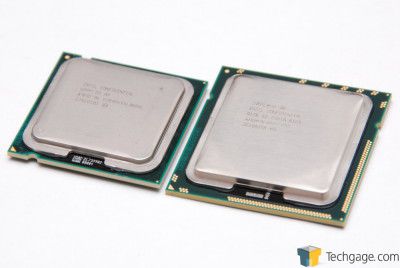From our front-page news:
Over the course of the past few years, the processor landscape, and others, have changed drastically. Even just five years ago, people thought very little of paying $1,000 for a processor. Back in those days, we were stuck to single-core models, and models that didn't overclock to the same degree that today's processors do. When you paid $1,000 for an "Extreme" edition of those processors of the day, you actually did see a fair boost in overall performance.
The situation is much different today. The premium on a $1,000 CPU still could have made a lot of sense on the first dual-core processors, because once again, the overall performance doesn't come close to processors of today, nor did the CPUs back then overclock quite as well as they do today. But since then, things have improved dramatically, from both AMD and Intel. Not only are the architectures as a whole much better, but we have affordable quad-cores, and unbelievable overclocking-ability.
So is it worth spending $1,000 on a processor in today's day and age? In a newly-posted video interview with AMD's Pat Moorhead (ironically posted on Facebook by an Intel employee), the answer is no. According to Pat, today, there is so much value in processors, that there just isn't a need to spend $1,000 on a chip. He also notes that we're reaching a point where the GPU is just as important as the CPU, although I personally think he's thinking a little too far in the future at this point.
I'm all for GPGPU, but the selection of applications is slim, and if you are looking to take advantage of what Pat speaks about, you're going to be forced towards a certain application. But from a gaming perspective, he's right... there just isn't a major advantage of a faster CPU in most of today's games. He notes that instead of spending $1,000 on a CPU, it would make more sense to spend $250, and then use the extra on better GPUs, or on the companies latest Eyefinity technology.

My ultimate question is this. Would Pat's attitude be the same if AMD had a product capable of competing directly with Intel's Core i7's? If AMD had a top chip that could take on the i7-975, would they charge much less, or go back to how it used to be and sell their highest-end model for $1,000? What do you guys think?
Source: Pat Moorhead Interview (YouTube)
The situation is much different today. The premium on a $1,000 CPU still could have made a lot of sense on the first dual-core processors, because once again, the overall performance doesn't come close to processors of today, nor did the CPUs back then overclock quite as well as they do today. But since then, things have improved dramatically, from both AMD and Intel. Not only are the architectures as a whole much better, but we have affordable quad-cores, and unbelievable overclocking-ability.
So is it worth spending $1,000 on a processor in today's day and age? In a newly-posted video interview with AMD's Pat Moorhead (ironically posted on Facebook by an Intel employee), the answer is no. According to Pat, today, there is so much value in processors, that there just isn't a need to spend $1,000 on a chip. He also notes that we're reaching a point where the GPU is just as important as the CPU, although I personally think he's thinking a little too far in the future at this point.
I'm all for GPGPU, but the selection of applications is slim, and if you are looking to take advantage of what Pat speaks about, you're going to be forced towards a certain application. But from a gaming perspective, he's right... there just isn't a major advantage of a faster CPU in most of today's games. He notes that instead of spending $1,000 on a CPU, it would make more sense to spend $250, and then use the extra on better GPUs, or on the companies latest Eyefinity technology.

My ultimate question is this. Would Pat's attitude be the same if AMD had a product capable of competing directly with Intel's Core i7's? If AMD had a top chip that could take on the i7-975, would they charge much less, or go back to how it used to be and sell their highest-end model for $1,000? What do you guys think?
Source: Pat Moorhead Interview (YouTube)
